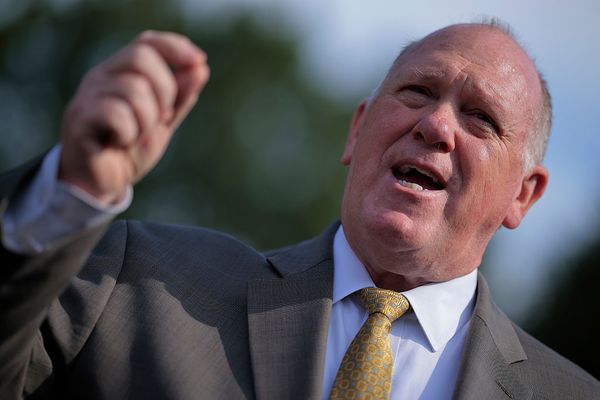Welcome to the Monday, February 26, 2024, Brew.
By: Juan Garcia de Paredes
Here’s what’s in store for you as you start your day:
- Ohio state senators introduce bill to prohibit ballot measure contributions from foreign nationals
- All candidates for North Carolina Secretary of State Republican primary complete Ballotpedia’s Candidate Connection survey
- Upcoming voter participation deadlines
Ohio state senators introduce bill to prohibit ballot measure contributions from foreign nationals
On Jan. 24, Ohio State Sens. Theresa Gavarone (R-2) and Robert McColley (R-1) introduced Senate Bill 215 (SB 215). It would prohibit foreign nationals from making any direct or indirect contributions or expenditures in ballot measure campaigns. Campaigns would be prohibited from accepting contributions from foreign nationals.
Secretary of State Frank LaRose (R) supports the legislation. Earlier in January, LaRose said “foreign nationals have funneled hundreds of millions of dollars into 501(c) entities” supporting 2023’s Issue 1, which created a state constitutional right to abortion.
SB 215 would define foreign nationals to include:
- an individual who is not a U.S. citizen or national;
- a foreign government;
- a foreign political party; and
- a person, other than an individual, that is organized under the laws of a foreign country or has its principal place of business in a foreign country.
Gavarone said, “For decades now, foreign nationals have not been able to contribute to the campaigns of candidates. [SB 215] basically expands that… to ballot issues, directly or indirectly.”
In a 2021 decision, the Federal Election Commission (FEC) ruled 4-2 that the current federal ban on foreign political contributions concerns candidate elections, not ballot measure campaigns. In 2023, U.S. Rep. Brian Fitzpatrick (R-Pa.) introduced House Resolution 4484 (HR 4484), the Keeping Foreign Money out of Ballot Measures Act of 2023. U.S. Rep. Jared Golden (D-Maine) joined as co-sponsor. As of Feb. 23, no further action had been taken on the bill.
Gavarone said the Sixteen Thirty Fund, an organization that contributed $13.4 million to ballot measure campaigns in Ohio in 2023, received funding from Georg Wyss, a Swiss billionaire. Gavarone said Wyss “for some reason, wants to play a part in our elections.” Gavarone also said the Sixteen Thirty Fund is funding an initiative campaign to establish a redistricting commission.
Marneé Banks, a representative for Wyss’ Berger Action Fund, which supports the Sixteen Thirty Fund, said the organization “prohibits its grants from being used to support or oppose political candidates or parties, or otherwise engage in electoral activities.”
Sen. William DeMora (D-25) responded to Republican Sens. Gavarone and McColley, saying, “Had your side prevailed [with last year’s ballot measures in Ohio], this bill wouldn’t have come to fruition, would it?”
In 2022, the Sixteen Thirty Fund provided $26.85 million to ballot measure campaigns in 10 states. The ballot measures addressed abortion, firearms, minimum wage, ranked-choice voting, and other election policies. The largest contribution was $11.26 million to the campaign supporting Michigan Proposal 2, which added several election and voting-related policies to the Michigan Constitution. In 2023, the Associated Press reported that tax returns, available from 2016, showed Wyss contributed $208 million to the Sixteen Thirty Fund.
In 2021, Amy Kurtz, the president of Sixteen Thirty Fund, said, “Nearly all of the donations we receive are intended for specific projects or purposes; many donations cannot be used for electoral activities; and every contribution is used in compliance with all guidelines, regulations, and laws.”
Should SB 215 be enacted, Ohio would be the ninth state to approve a law prohibiting contributions to ballot measure campaigns from at least some foreign nationals. States have different definitions for foreign national. In Maine, for example, the law addresses foreign government and foreign government-owned entities but not individuals. In California, which bans foreign contributions to ballot measure campaigns, the definition of foreign principal does not include permanent non-citizen residents.
According to a 2021 New York Times article, Wyss, who lives in Wyoming, “has not disclosed publicly whether he holds citizenship or permanent residency in the United States.”
In 2024, bills on foreign donations to ballot measure campaigns have been introduced in Illinois, Missouri, Oklahoma, and Wisconsin. As of Feb. 21, Ballotpedia had tracked 208 bills on ballot measures, initiatives, veto referendums, referrals, local ballot measures, and recall elections in 36 states. A list of bills is available here.
All candidates for North Carolina Secretary of State Republican primary complete Ballotpedia’s Candidate Connection survey
If you’re a regular reader of The Daily Brew, you know about our Candidate Connection survey. The survey allows voters to hear directly from candidates about what motivates them and their priorities.
In races where all candidates completed the survey, voters get a unique opportunity to compare and contrast the candidates’ backgrounds, objectives, and experiences.
Today, we’ll look at the March 5 Republican primary for North Carolina Secretary of State, where all three candidates — Chad Brown, Jesse Thomas, and Christine Villaverde — completed our survey.
North Carolina is one of seven states holding elections for secretary of state this year. Republicans hold three of the offices up for election and Democrats hold four.
As head of the Department of the State, the secretary oversees economic and business-related operations of the state government. The department provides the initial infrastructure for corporate organizations, addresses fraud by providing accurate and timely information, and issues professional credentials. Unlike in most states, the North Carolina secretary of state does not oversee the state’s elections.
Incumbent Elaine Marshall (D), first elected in 1996, is running for re-election. In 2020, Marshall defeated E.C. Sykes (R) 51%-49%, her closest election since taking office.
Here are the Republican primary candidates’ responses to the question: What areas of public policy are you personally passionate about?
Brown:
“One area that is close to my heart is protecting and promoting the sanctity of life. I firmly believe in the value and dignity of every human being, from the earliest stages of life to natural death.
“Fiscal responsibility and limited government are values that I hold dear. I believe in lowering taxes, reducing government spending, and eliminating unnecessary regulations hindering economic growth and entrepreneurship.”
Thomas:
“1. Eliminate the state income tax:
- Starting with first responders, active duty military, seniors citizens, teachers, and eventually including all North Carolinians; we will ease the financial burden caused by Joe Biden’s failed economy while luring new jobs to our state.
“2. Term limit the secretary of state:
- The incumbent has been in office since 1997. North Carolina has had only 3 elected secretaries of state since 1936.
- I will push the legislature to term limit the office.
“3. Modernize the secretary of state’s office:
- Secretary of state become chief elections officer like over 90% of states.
- Constantly push the envelope to make our state as attractive for investment and business expansion and relocation as possible.”
Villaverde:
“Citizens deserve the best possible constituent experience from their elected officials. As North Carolina’s next Secretary of State, I will ensure that citizens are able to access information and services quickly through various channels. Citizens must be able to access the services of the Secretary of States office more easily and I will ensure that my agency proactively provides up-to-date and accurate information to better streamline agency services. I will also ensure my office is transparent and responsive to constituent inquiries.”
Click on the candidates’ profile pages below to read their full responses to this and other questions.
We ask all federal, state, and local candidates with profiles on Ballotpedia to complete our Candidate Connection survey and share what motivates them on political and personal levels. Ask the candidates in your area to fill out the survey.
To read more about this year’s Republican primary for North Carolina’s Secretary of State, click the link below.
Upcoming voter participation deadlines
With the 2024 election season well underway, we are looking at the important deadlines voters need to be aware of over the next two weeks to take part in their state’s primary election.
Twenty-nine states have important voter participation deadlines this month. These include voter registration deadlines, early voting opening and closing dates, deadlines to request absentee/mail-in ballots, and deadlines to return those ballots.
The map below shows the states that have voter participation deadlines scheduled in the next two weeks. The bulleted list below includes every state with deadlines taking place this month.
- Alabama: March 27 (deadline to request an absentee/mail-in ballot by mail), March 29 (deadline to request an absentee/mail-in ballot in-person or online), March 4 (deadline to return an absentee/mail-in ballot in-person), March 5 (deadline to return an absentee/mail-in ballot by mail).
- Alaska (Republican presidential primary): March 5 (voter registration deadline).
- Arizona (presidential primary): March 8 (deadline to request an absentee/mail-in ballot), Feb. 21 to March 15 (early voting period).
- Arkansas: Feb. 27 (deadline to request an absentee/mail-in ballot by mail or online), March 1 (deadline to request an absentee/mail-in ballot in-person), Feb. 19 to March 4 (early voting period), March 5 (deadline to return an absentee/mail-in ballot).
- California: Feb. 24 to March 4 (early voting period), March 5 (deadline to return an absentee/mail-in ballot).
- Colorado (presidential primary): March 5 (voter registration deadline), Feb. 26 to March 5 (early voting period), March 5 (deadline to return an absentee/mail-in ballot).
- Delaware (presidential primary): March 9 (voter registration deadline).
- District of Columbia (Republican presidential caucus): Feb. 26 (online voter registration deadline), March 1 to March 3 (early voting period), March 3 (deadline to return an absentee/mail-in ballot).
- Florida (presidential primary): March 7 (deadline to request an absentee/mail-in ballot), March 9 to March 16 (early voting period).
- Georgia (presidential primary): March 1 (deadline to request an absentee/mail-in ballot), Feb. 19 to March 8 (early voting period).
- Hawaii (Democratic presidential primary): Feb. 28 (deadline to request an absentee/mail-in ballot), March 6 (voter registration deadline), March 5 (deadline to return an absentee/mail-in ballot).
- Illinois: March 3 (online voter registration deadline), March 19 (in-person voter registration deadline), Feb. 8 to March18 (early voting period).
- Iowa (Democratic presidential caucus): March5 (deadline to return an absentee/mail-in ballot).
- Kansas (presidential primary): Feb. 20 (deadline to request an absentee/mail-in ballot), Feb. 28 to March18 (early voting period).
- Louisiana (presidential primary): March 2 (deadline to request an absentee/mail-in ballot online), March 9 to March 16 (early voting period).
- Maine (presidential primary): Feb. 29 (deadline to request an absentee/mail-in ballot), March 5 (in-person voter registration deadline), Varies to Feb. 29 (early voting period), March 5 (deadline to return an absentee/mail-in ballot).
- Massachusetts (presidential primary): Feb. 27 (deadline to request an absentee/mail-in ballot), Feb. 24 to March 1 (early voting period), March 5 (deadline to return an absentee/mail-in ballot).
- Michigan (presidential primary): Feb. 26 (deadline to request an absentee/mail-in ballot in-person), Feb. 27 (deadline to return an absentee/mail-in ballot).
- Minnesota (presidential primary): March 4 (deadline to request an absentee/mail-in ballot), March 5 (in-person voter registration deadline), Jan. 19 to March 4 (early voting period), March 5 (deadline to return an absentee/mail-in ballot).
- North Carolina: Feb. 27 (deadline to request an absentee/mail-in ballot), March 2 (in-person voter registration deadline), Feb. 15 to March 2 (early voting period), March 5 (deadline to return an absentee/mail-in ballot).
- Ohio: Feb. 21 to March 18 (early voting period),
- Oklahoma: Feb. 29 to March 2 (early voting period), March 5 (deadline to return an absentee/mail-in ballot).
- Rhode Island (presidential primary): March3 (voter registration deadline).
- Tennessee (presidential primary): Feb. 27 (deadline to request an absentee/mail-in ballot), Feb. 14 to Feb. 27 (early voting period), March 5 (deadline to return an absentee/mail-in ballot).
- Texas: Feb. 20 to March 1 (early voting period), March 5 (deadline to return an absentee/mail-in ballot).
- Utah (presidential primary): March 5 (in-person voter registration deadline), Feb. 20 to March 1 (early voting period), March 4 (deadline to return an absentee/mail-in ballot by mail), March 5 (deadline to return an absentee/mail-in ballot in-person).
- Vermont (presidential primary): March 5 (voter registration deadline), Jan. 20 to March 5 (early voting period), March 5 (deadline to return an absentee/mail-in ballot).
- Virginia (presidential primary): March 5 (in-person voter registration deadline), Jan. 19 to March 2 (early voting period), March 5 (deadline to return an absentee/mail-in ballot).
- Washington (presidential primary): March 4 (deadline to request an absentee/mail-in ballot by mail or online), Feb. 23 to March 12 (early voting period).
Looking ahead
March is the busiest month for primary elections with 33 separate primaries and caucuses scheduled across 30 states. We’ll bring you everything you need to know to vote in the rest of the contests in March as well, so stay tuned!







